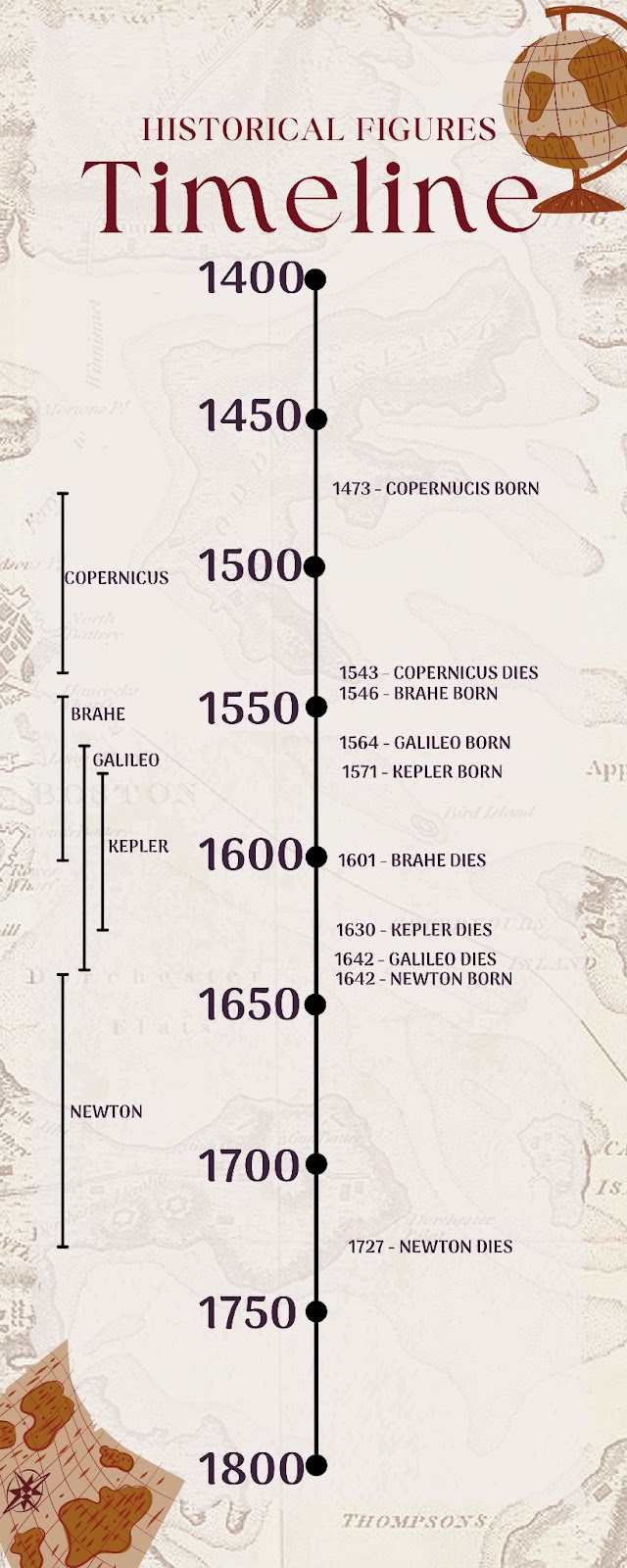Historical Figures
Nicolaus Copernicus was born on February 19, 1473, and died on May 24, 1543. Johannes Kepler was born on December 27, 1571, and died on November 15, 1630. Tycho Brahe was born on December 14, 1546, and died on October 24, 1601. Galileo Galilei was born on February 15, 1564, and died on January 8, 1642. Isaac Newton was born on December 25, 1642, and died on March 20, 1727.
I made a timeline which shows how Brahe, Galileo, and Kepler were all contemporaries, but Copernicus came before, and Newton came after.

Kepler was vital to the development of astronomy because he developed a number of mathematical laws that are vital to our understanding of orbiting objects in space. In his time, these new laws were able to help confirm the heliocentric theory of the solar system, as well as track and predict astronomical events. Even today, his laws are taught and used in astronomy to make predictions about everything from orbiting debris from spacecraft to colliding galaxies. (https://www.britannica.com/biography/Johannes-Kepler)
When Johannes Kepler was 29 years old, Jacopo Peri debuted an innovative show that mixed a full orchestral score with a plot and singing characters at a grand theater in Venice. Today, we consider this, Euridice, to be the first opera ever written and performed. It sparked centuries of tradition that expanded all around Europe, and made a massive impact on what people imagined secular music could be. When he was 49 years old, the Mayflower would land in Cape Cod. This is considered to be one of the founding moments of the American identity, as it was one of the earliest successful British colonies in North America, and many Americans can trace their heritage back to people on the ship. (https://en.wikipedia.org/wiki/Euridice_(Peri))
At the beginning of Kepler’s life, the Protestant reformation had largely concluded, but the Catholic church was still in the midst of its counter-reformation. This largely culminated in one of the most important events in the history of the church, the Council of Trent, headed by Pope Pius V. Pius V is known, naturally, as one of the great reformers of the church, greatly changing the way the pope acted in his role as spiritual leader, especially in his rebukes of corrupt church practices. (https://www.franciscanmedia.org/saint-of-the-day/saint-pius-v/)
I find it fascinating that what we consider to be one of the oldest traditions of European music is so recent in its development. It is also fascinating to see how little we actually know about music before this time period. Unlike in astronomy, which tends to build on any existing knowledge, music is a continually rich and evolving cultural expression which can be lost with time. It also greatly informs how I imagine the lives of people like Copernicus. His musical tastes would have been so foreign to ours.




